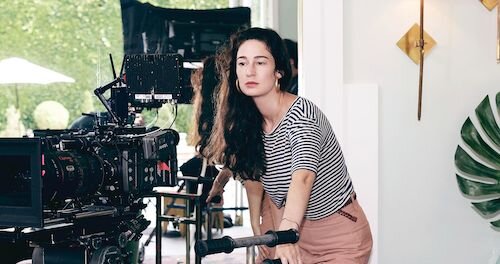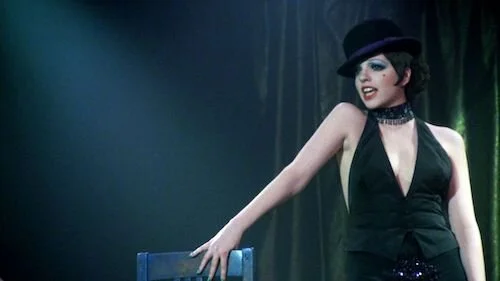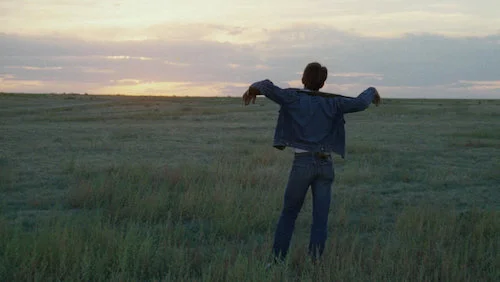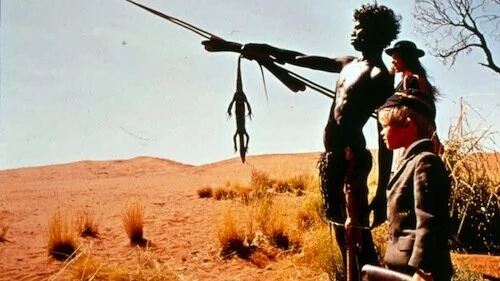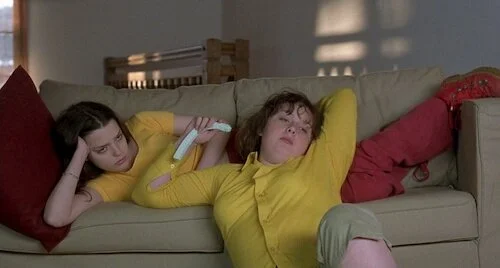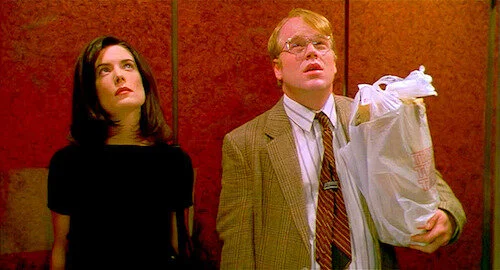Poppy Gordon and "For Your Consideration": Capturing a Discussion Through Comedy
Poppy Gordon is an emerging New York filmmaker —and founder of the studio Feral NYC — who has extensive experience as an artist (having worked for companies like Nike, TRESemmé, and PayPal) and as a pupil (having studied under Claire Denis, Catherine Breillat, and Chris Kraus). She has entered 2020 with her debut short ready for the world to see. For Your Consideration is a much-needed satirical look at the film industry that takes on a multitude of ideas in a brief amount of time. This includes dishonest production (in the name of winning awards disingenuously), the misuse of important movements, and the misapprehension of female directors and their messages to the world. For Your Consideration is due to play at a variety of film festivals, including Cinequest (a major qualifier for the Academy Awards), Chattanooga Film Festival, and more. The film premieres at Cinequest on March 7th.
We got a sneak peak at the short, and found the narrative to be a brisk-yet-poignant observation on filmmaking for the wrong reasons; of course, this is done with Gordon’s own truthful vision. The short takes place over a production meeting on a new potential film, and every shot is secretly textured with commentary. Colours are cleverly used via wardrobe (primary and secondary hues are scrolled through quickly: a visual feast of a metaphor on the speed of the film industry’s urgency to move on to the next voice). Seating arrangements dictate the staying power of ideas within the meeting. Everything is done with a sarcastic, other-worldly touch, as For Your Consideration shimmers with a tongue-in-cheek sheen. The film even works on a meta level, with additional scenes continuing during the credits, which change the tone of the finished narrative completely; it’s like a dream being faced with reality.
We are happy to say that Poppy Gordon shared some time with us to discuss For Your Consideration in depth. We are beyond privileged to be one of the first outlets to champion this playfully-serious parody of a problematic industry with the rising visionary behind it. Please discover her works over at her official website, and check out the pages for Feral NYC and For Your Consideration.
Films Fatale: What does it mean to have your short picked up by Cinequest, a festival known for its Oscars eligibility? Is there something meta about having a short about vying for Oscars being shown at such a festival?
Poppy Gordon: It means a lot to be picked up by such an important festival. We thought it was pretty cool that Cinequest was willing to dialogue with us, as our piece questions the intentions of Hollywood at large when it comes to the films that they choose to champion. And there’s definitely something meta about it. On the one hand, we’re hating on the game but here we are trying to get drafted. Our characters all have these connections to get a short film made and into festivals. We, as the actual makers of this film, do not! In that sense, it was definitely funny, but also a bit of a coup to get into Cinequest. They obviously have a sense of humor and aren’t afraid to make their own bold choices.
FF: Where did the concept of For Your Consideration come from? Was it a short you always wanted to make, or did the idea come to you in the wake of recent movements?
PG: It definitely came in the wake of recent movements. That’s very true. It’s not an idea I’ve been keeping in a closet, holding onto for a long time and finally got to make. If anything, it was inspired by frustration. My screenwriter and me — we’re also friends — were talking and wondering about how films like Green Book get made and how they keep winning awards. And the more we talked about it, the more it became a conversation about cultural appropriation, tokenism and the commercialization and co-opting of social justice movements. And how it all ties back to how those with privilege get to define popular culture.
FF: Was there a challenge in having characters like Samantha Robinson's character tip-toe along the line of being socially aware, and being insensitively ignorant? How often to many people in society confuse inclusivity and bigotry, and is that what led to a satirical take like For Your Consideration being made?
PG: It was definitely a challenge. We don’t want to attack the inclusivity movements themselves. At its best, the shift in representation has the potential to create a pop culture that includes everyone. More often than not, even the people — like our characters who lack the self awareness to recognize that these aren’t their stories to tell — are motivated by good intentions. They need a little nudge to look outside of themselves, because they have to learn that anytime you look at someone else’s pain and see dollar signs, there’s probably a problem. I do think that it happens frequently, that our society is confusing tokenism for inclusivity. We recently just saw it with American Dirt, right? [writer’s note: American Dirt is the Jeanine Cummins novel that has come under fire for its stereotypical and considerably insensitive take on a Mexican narrative, despite Cummins’ best intentions] Big confusion there!
For Your Consideration.
FF: It’s almost as if a good intention is turned into something with marketability. It’s almost as if we aren’t learning anything, because we’re taking a serious issue and turning it into a profit.
PG: Yeah. Exactly. It’s kind of like, as soon as the movement started, this push towards inclusivity and new voices and how that can then affect things, as soon as that moment happened and started to breathe, I felt like there was some co-opting that was immediately happening, where it was turned into… “how can different entities, companies, movies, whoever, take this movement and use it as proof of ‘we’re not guilty of exclusionary behaviour! We’re inclusive! Please don’t question existing power structures!”
FF: With the producer character, you’re learning less about how this character cares about what’s going on, and more about “I hate x, y and z group of people, which are getting a lot of attention. Is there a way we can flip the narrative on them?” The complete misappropriation of what’s going on, which is unfortunately a heavy reality in Hollywood.
PG: This was definitely a territory we were careful about wading through. It is a very hot button subject matter, all of it. The way the American press, a lot of times, reacts to things is very sensational and polarizing; not really fostering a deeper dialogue of the subject matter. We wanted to have our voices heard in that conversation. We just wanted to be very mindful about how we were going to enter into it. Also, using comedy was important to us. Having nothing be too precious that we couldn’t also laugh at ourselves with. Comedy itself has been questioned as a genre, as of recently. That’s been brought up. Todd Phillips, the director of Joker brought it up. I think he mentioned something that he felt like comedy had become too serious and trepidatious of territory for him and it was part of what motivated him to want to make a more serious film.*
It’s come up a lot recently, that comedy as a genre has to redefine itself and respond to things. We wanted to use that genre as a means of discussing some pretty serious subject matter, but still do it in a way that would invite people to participate and laugh, not be so afraid that one couldn’t laugh and participate in this kind of dialogue, because it’s only by getting these subjects out there and talking about them that we can also get to a new place. Completely shushing about matters, isn’t the answer either.
*(Poppy Gordon later found the actual quote from Vanity Fair and shared it with us: “Go try to be funny nowadays with this woke culture,” Phillips told VF. “There were articles written about why comedies don’t work anymore — I’ll tell you why, because all the fucking funny guys are like, ‘Fuck this shit, because I don’t want to offend you.’”)
For Your Consideration.
FF: I feel For Your Consideration definitely takes a lot of things that people are scared to bring up, as to be associated with hate speech or anything like that, when you’re really bringing up a point. It makes comedy out of [a serious discussion], but it does so in such a clever way, where I one hundred percent know that [the film] isn’t making fun of marginalized groups. The film makes fun of the Hollywood executives that only stereotype people, hence the reason why people are scared to make comedy out of anything that’s edgy anymore. It’s an interesting take that goes full-on with what a lot of filmmakers are scared to do, but you do it the right way, and in a way that’s revelatory to people that are living under a rock with the situation.
PG: Exactly! That’s one hundred percent what we were trying to do. We didn’t want to take the edge out of comedy. We didn’t want to take the bite out. We wanted to be mindful about how we join the conversation and not timid. Because, frankly, the only way to be heard is to actually say something.
FF: In that sense, For Your Consideration is a great title that has a double connotation. It’s playing on the awards season three-words that guarantee you a nomination, and it’s also for your consideration. You're inviting me to watch this and start this conversation on how to approach this kind of subject.
PG: Exactly! It’s a play on festivals and the Oscars and the way the industry shapes the art rather than the other way around. That's a lot of heavy stuff to undertake in thirteen minutes! We welcomed the challenge.
FF: Your use of scenes shown throughout the credits is interesting, as if you get a different story before and after the credits. How did you decide to split the film up in such a clever way?
PG: Even though it’s a short film (it’s only thirteen minutes), I guess it does reward concentration span. Those that can stick around and watch the credits (and aren’t just straight away mov[ing] on to the next one)… there’s a bit of an easter egg hidden there that changes the entire perception they might have of the film. There was some of this bookending on each side that we wanted to do. In the beginning, we wanted to round out the characters, establish a little bit more of their background and who they are. Where does the story live? Who are these girls that you get to know? That’s the beginning, and we wanted to provide a bit of a surprising contrast at the end. Of course, we’re also commenting on what’s going on in Hollywood as well, with reality television and influencers, and the tradition of narrative and actors, all of that. It works on numerous levels. We wanted to open it up a little bit. Even though it is a short, we wanted to tell a bit of a story with a beginning, middle and an end!
For Your Consideration.
FF: Is there a possibility for this team to show up again in sequel shorts that tackle the same problems but from different angles? Could this turn into some sort of a series?
PG: There’s no telling how many seasons it could take for our characters to learn even a mound of self awareness! I think it would be definitely fun to be able to turn this into a series. From a financial standpoint, making this was definitely hard on my savings. If we did make a series, it would be great to get some outside help! CALL ME! ;-) [writer’s note: we agree. Please call and make this happen].
FF: You may have to have a Seinfeld or It’s Always Sunny in Philadelphia approach: No hugging, no holding. The producer maybe never, ever learns, because she’s so stuck how she is. That’s where the gold comes from: seeing the extent that a lot of these executives have, and yet they are in charge of what we see, which is disturbing.
PG: Exactly!
FF: Is there any particular reason why the main producer character is a female executive? Is that how the character was, or or a particular statement? It’s usually a guy Hollywood executive that’s stereotypically played, and backwards male studio heads are considerably responsible for many of these problems in Hollywood?
PG: There was. This was very thought out. This was something that Aldo, who is my writer in this, we worked together and had a lot of conversations about this. It’s something we questioned a lot. “Should we mix it up? Should we not?” I am a female filmmaker. I am making a film about, largely, female creators, sitting at a table in it. They’re not the most awesome characters. They’re emblematic of Hollywood’s efforts to diversify, “sharing” their power with people who were always at or near the top of the pyramid.
FF: They’ve got deeply rooted problems. They’re problematic.
PG: They’re all very problematic in their own way. Part of the reason why we wanted to do that was to go beyond gender or ethnicity and look at privilege. We really wanted to focus on privilege here, how privilege isn’t really changing who has a seat at the table, in terms of making decisions, and how that — in and of itself — is very problematic.
FF: It’s almost a statement that it’s not just singular people, who are guilty in their own way, but this over-one-hundred-year-old industry that hasn’t been fixed properly since its archaic, bigoted ways back in the 1800’s. Thus, this is the result, where it’s the norm, and anybody — even those this industry neglects — are a part of this system, and they may not realize it.
PG: It’s really about the fact that, if the existing… how can things really change, if the people making the decisions are still making decisions from positions of power granted by a broken system? They’re still passing the scepter amongst each other. It’s a very old school establishment. We tried to get that across. All of the characters in there, their parents — or probably their grandparents — are all a part of the system. They’re all pretty well off in a sense. Despite any differences in ethnicity, race or orientation, they are all coming from this perch of privilege that empowers them to make bad decisions and never feel the blowback or shame for their actions. And with that I’m not trying to say that there aren’t artists and creators that come from privileged backgrounds that aren’t also capable of making sensitive choices either. We are speaking in broad terms.
And part of it is that I wanted to go against expectation. Me, as a female filmmaker, I can make films and say whatever I want. I can go against the grain and create female characters who aren’t perfect and who are problematic. In this case, I was making a statement about the Hollywood establishment and how culture is being crafted by those with privilege. That was more of the point there.
FF: What do you think Hollywood gets right about its recent methods of tackling inclusivity and/or awareness? What does it get dead wrong?
PG: I think it’s great that Hollywood recognizes that something needs to change. In order to ensure that representation isn’t just turned into a new PC form of tokenism, that diminishes the creative potential and work of the artists as individuals, we really need to look at existing power structures. That’s my humble two cents. I guess I wanted to chime in on this existing cultural dialogue that we’re having. Make that addition.
I also wanted to get at the idea that just because I’m a female filmmaker, I don’t think it should mean that I get to make, at the best, one day Wonder Woman. I should also be able to make Batman, if I’m the best one for the job or at least be considered. Those are some fine tuned points I think we need to get added into the fray here.
FF: For me, this goes back to the problematic retort that people give when female filmmakers aren’t nominated: “It should be about the best”. While that is true, only five women being nominated for Best Director doesn’t make any sense. What about Agnès Varda? Jane Campion more than once? Greta Gerwig more than once? There are so many fantastic female filmmakers that should be able to say whatever they want, because they have the ability to do so. We’re making some strides, but we have a ways to go with how it gets represented and appreciated. I hope one day that is a possibility, where a filmmaker, like you, can make the next Batman, and it isn’t a problem for the dinosaur executives.
PG: One of the things that I really took to heart came from the miniseries Feud. There was a line there that I thought was really true. The essence of it was: men frequently get judged based on their potential, while women, frequently, based on past work. Women end up having to work so much harder than men to get the same opportunities, simply because of the way that we look at men in society. We are more trained, in America specifically, to see men as figures of authority. If they're big, small, have booming voices, delicate voices. We are used to associating, attributing authority to them simply because of their gender. Incorrectly so. As a culture, we haven’t figured out how to fully recognize the power in feminine attributes.
That’s been the notorious problem. In order to get greater representation into the mix, there’s also more of a leap and risk that needs to be taken on the part of people in existing positions of power. In a sense, they need to assume that the underrepresented member in front of them can do the work, even if they don’t have that existing example in that portfolio. Men get afforded that leap-of-faith all the time. “They can probably do it”. Less so to the other parties. White men can run on this early encouragement while members of minority groups can give up if they encounter so much prejudice - and we simply shouldn’t have to outwork establishment candidates, for the same opportunities, and then just as we do, it’s time for agism.
I also though don’t think it needs to swing the other way to such an extent that then white men find it difficult to get their voices heard. The point - we should have equal opportunity at opportunity and for that we need to be aware of inherent biases. I think all of us want to have a chance at being creators and decision makers and it should be based on our ability, talent, and hard work.
FF: It’s like “Where’s your portfolio? You haven’t done anything!” Because these filmmakers had to take so long to get here!
PG: Exactly! There are so many boundaries that still need to be pushed through. There’s so much to say about this subject matter. So much work that still needs to be done. We can’t just rest on our existing laurels, and not push this conversation even further.
FF: We like to send interviews off with the most basic question, based on why we are all cinephiles. What are your top five films of all time, and why?
PG: I think cutting my favourite films down to five is just torture! I came up with some that I really like. They’re all for various reasons that I love them. There are so many movies that I love. Some of the films that I always know that I refer to over and over again in my inspiration bank are:
Cabaret
PG: I love Cabaret.
Badlands
PG: I love the movie Badlands.
Walkabout
PG: I also really love the film Walkabout, which is probably a little less known.
Fat Girl
PG: I really love any film by Catherine Breillat, such as Fat Girl, or Diary of a Very Young Girl. Bluebeard. Her whole oeuvre is very personally important to me.
Happiness
PG: Of course, also Happiness, by Mr. Todd Solondz.
Others that are very close to me as well that didn’t make the top five… I could just go on and on about my favourite films. It’s the same about the Oscars. It’s competition. I don’t believe in it. They’re all just fantastic films. The Cement Garden. Turkish Delight. The Lovers Under the Bridge. Belle de Jour. Affliction. The King of Comedy. All of these are rare gems.
We thank Poppy Gordon for discussing For Your Consideration with us. Please visit the film’s website here, as well as Poppy’s site (to find out more about her work), and Feral NYC’s page. For Your Consideration premieres at Cinequest Film Festival March 7th, 2020.
Andreas Babiolakis has a Masters degree in Film and Photography Preservation and Collections management from Ryerson University, as well as a Bachelors degree in Cinema Studies from York University. His favourite times of year are the Criterion Collection flash sales and the annual Toronto International Film Festival.

